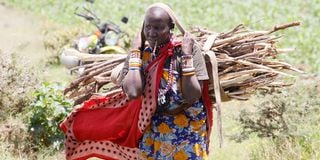Kajiado study exposes dire need for women's empowerment interventions

A woman carrying a bundle of firewood. Neglecting their own health because they are “expected to be taking care of others” speaks volumes about the opportunity cost women bear.
What you need to know:
- The Kajiado study on women in Kajiado County highlights women's delayed healthcare seeking due to domestic responsibilities, revealing the need for empowerment interventions.
- It exposes the intersection of gender inequalities, emphasising the urgency for investment in girls' education and community dialogue to challenge harmful practices.
- Efforts must focus on valuing women's labour, promoting education, sharing domestic responsibilities, and engaging men in dismantling oppressive systems.
The story by Angela Oketch about a study on women of Kajiado County (Daily Nation, April 19) illustrates a number of gender concerns. Titled “Documentation of unpaid care and domestic work in Kajiado County’ the study established that women “delay seeking medical care until their conditions become critical”.
The study findings demonstrate two levels of empowerment as configured in Sara Longwe’s Gender Equality and Empowerment Framework. First is welfare, which deals with practical needs for sustenance of human life. Poor health is a constraint to the development of human capital.
A sick woman is not productive hence has limited capacity to fulfil the expectations of the family and community. Neglecting their own health because they are “expected to be taking care of others” speaks volumes about the opportunity cost women bear.
The second level is that of conscientisation, which refers to awareness and mobilisation to tackle it. In this case, it refers to women’s indifference to available health services because of ignorance. The net effect is that more resources will be spent to treat advanced illnesses.
Mental strains
The issue of workload is revealed in the finding that women are pre-occupied with domestic chores. This demonstrates welfare, participation and control dimensions of empowerment. The women’s work is direct and physical hence irreplaceable; the women are domesticated and constrained from external spheres; and they cannot decide over their time use.
While most studies end at the physical burden, this one identifies the associated psychological and mental strains of workload, such as pressure to complete the work, lack of time for leisure, emotional investment in the tasks, limited spec for social interactions and insufficient time for self-care.
A critical dynamic highlighted is that of violence, that women faced physical battery from husbands if household work was not completed on time. That men have the latitude to enforce their needs through violence demonstrates patriarchal entitlement to women’s labour and other services. What kind of protection is available for such women? Do they even know about the Protection against Domestic Violence Act?
The social and cultural costs are perhaps too high for them to even contemplate reporting their husbands. Consider the looming fear of further battery, divorce, time spent seeking justice, alienation from the extended family, peer pressure to resolve the issue domestically and opprobrium from the maiden family. Failure to get legal redress results in a vicious cycle where perpetrators continue to violate women with impunity.
Domestic chores
The study also talks about high levels of illiteracy among women, which means that girls are not taken to school. Illiteracy closes one off from the world of civilisation and even lowers individual dignity.
The intersection between education and workload is captured in the finding that girls are routinely withdrawn from school to “take care of family members or help with domestic chores”. If there is one thing that can transform the lives of women and girls, it is education. This is an asset that enables them to know and claim their rights, and equips them to compete in the labour market, become self-reliant and get exposed to a wider world.
Intersectionality is again revealed in the finding that the next option for girls who drop out of school is marriage. Such girls forget about education totally in order to concentrate on motherhood and marital duties. Marriage means that their maiden families lose out on the labour for which they were withdrawn from school in the first place. The nuptial homes do not enjoy the benefits they would have brought with formal education.
That such marriage is motivated by appetite for bride wealth is a patriarchal relic we should be liberated from.
Harmful practices
In the first place, this wealth does not even benefit the women they are paid for, except in sentiment. Bride-wealth also enslaves women to abusive marriages as they are pressured to stay lest their patents be asked to return the bride-wealth if they decamp!
These factors show that women largely lack autonomy to decide on and control their own destiny. They call for interventions that address the root causes of gender inequalities. First is the value placed on women and girls: Should women continue to be treated as mere sources of cheap labour and bride-wealth?
Second, there must be enhanced investment in formal education of girls as a right.
Third is to tackle workload through deliberate sharing, use of technology to reduce the drudgery and save time, and fiscal policy measures that reward women’s unpaid work.
Fourth, communities must be engaged in perpetual discussions on harmful traditional practices that subordinate, marginalise, exploit and violate women and girls. These conversations must put men at the centre, being the principal decision-makers and beneficiaries of the system.
The writer is a lecturer in Gender and Development Studies at South Eastern Kenya University ([email protected]).





